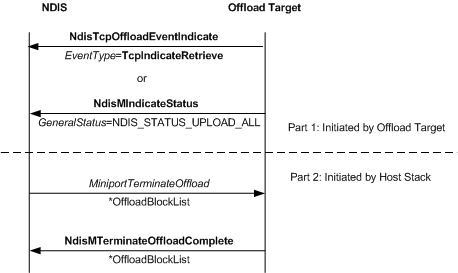Terminate Offload Sequence
[The TCP chimney offload feature is deprecated and should not be used.]
The following figure shows the terminate offload sequence. An offload target performs Part 1, and the host stack performs Part 2. If the offload target does not request the terminate offload operation, the sequence starts with the first step of Part 2.

Part 1: Terminate Offload Requested by an Offload Target.
The offload target calls either of the following:
NdisTcpOffloadEventHandler with an event type of TcpIndicateRetrieve to request the host stack to terminate the offload of a single TCP connection. The offload target specifies the reason for the termination request as a TCP_UPLOAD_REASON value in the EventSpecificInformation parameter that it passes to the NdisTcpOffloadEventHandler function.
NdisMIndicateStatusEx with the NDIS_STATUS_INDICATION-> StatusCode member set to NDIS_STATUS_UPLOAD_ALL to request the host stack to terminate the offload of all TCP connections that have been offloaded to the offload target.
Part 2: Terminate Offload Initiated by the Host Stack
NDIS calls the offload target's MiniportTerminateOffload function. In this call, NDIS passes a pointer to an NDIS_MINIPORT_OFFLOAD_BLOCK_LIST structure that can be stand-alone or the root of a linked list of such structures. Each NDIS_MINIPORT_OFFLOAD_BLOCK_LIST structure can be immediately followed in memory by a delegated state structure (XXX_OFFLOAD_STATE_DELEGATED).
The offload target copies delegated variable values into the host stack-supplied delegated state structures.
The offload target writes a completion status of NDIS_STATUS_SUCCESS or NDIS_STATUS_FAILURE to the Status member of each NDIS_MINIPORT_OFFLOAD_BLOCK_LIST structure in the linked list.
The offload target calls the NdisMTerminateOffloadComplete function to return the linked block lists and the associated XXX_OFFLOAD_STATE_DELEGATED structures to the host stack.
The offload target frees all resources, such as memory, that are associated with the terminated state objects.